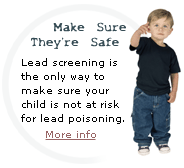|

|
 |
|
 
|
  |
|
 |
| |
 |
A majority of Vermont homes built before 1978 contain lead-based paint. Lead-based paint that is deteriorated or on a friction or impact surface often produces dust that collects on window sills, floors, toys or other surface areas that children usually have contact with. Because small children are much more likely to ingest and absorb lead dust, regular daily cleaning of surfaces where children play and where dust collects should be part of every child care center's routine. Daily cleaning along with other simple measures can make a big difference in preventing children from being poisoned.
The following questions will help you determine if your daycare is at risk for lead poisoning. |
|
- Was your home built before 1978?
A majority of homes built before 1978(especially homes built throughout the 1940s to the 1960s), contain lead-based paint, which can have a dangerous effect on the health of young children (under the age of six) and pregnant women.
- Do you see walls, furniture, or window sills in your home with chipping or peeling paint?
Lead-based paint is unsafe if it peels, chips, or cracks. Harmful lead dust is created when windows, doors, edges of stairs, rails, or other lead-based painted surfaces wear away over time. You can get your home checked for lead by hiring a trained, certified professional.
- Does your daycare have a outside play area?
Soil around homes with lead-based paint may have lead chips, dust, or flakes in it. Children can accidentally swallow this soil while playing outdoors, or the soil may be tracked indoors from shoes onto carpet and floors where children can eventually come into contact with it. Teach children to wipe and remove their shoes, as well as to wash their hands, after playing outdoors.
- Do you store food in imported pottery that contains lead?
Imported pottery and dishware usually contain lead. Use imported pottery only for decoration, and keep food and drinks in other safe, storage containers.
- Does your spouse work with lead in his/her job?
You may be exposed to lead on the job if you work as a painter, iron worker, construction worker, cable splicer, automobile radiator repair mechanic, firearms instructor, metal shop worker, stained glass artist, or battery maker. Anyone who works in a lead-related industry should change their work clothes and remove their shoes before entering the home, as lead can be tracked indoors onto carpets, floors, and furniture.
|
| |
|
|
|


